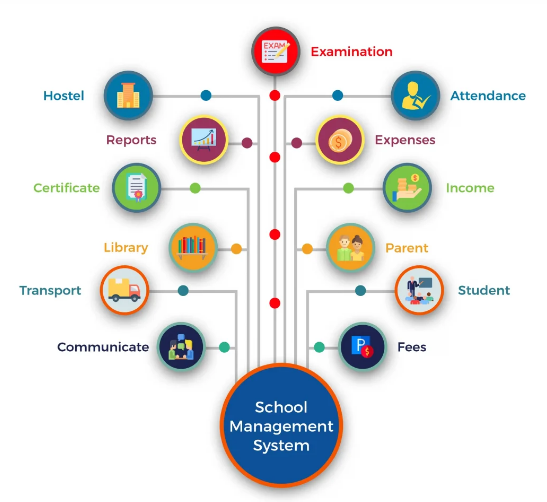
What Is the Concept of School Management?
A school management system (SMS) is a technology that allows the administration of educational institutions to measure, access, link, and coordinate learning processes.This classification is based on the fact that this sort of software is intended to help educational institutions with their day-to-day operations by automating administrative tasks.
A “school management system” is sometimes known as “school management software” or a “student information system.
” These systems include everything from application and class registration to comprehensive performance monitoring and finances.
Administration management often encompasses both the school and the student. Some systems include a feature set to help with day-to-day operations,
such as facility management, supply, and inventory.
What Are the Advantages of the School Management System?
A school management system that promotes operational performance and engagement between students, instructors, and parents has several advantages.
The following are the top X approaches for advantages of school management system organizations:
1- Saves time
It saves instructors valuable time from administrative tasks. This is achieved by automating time-consuming daily tasks such as timetable creation,
attendance management, parent-teacher conversations, and so on.
The school administration software may also generate a variety of reports to assist teachers and principals, saving money in the process.
Directors may also save time by making optimal use of modules such as payslip generation, online fee collection, transportation, and so on.
2- Very beneficial in report making
The primary advantage of school management software for school managers and directors is the variety of reports generated inside the program,
that can be utilized to make quick and precise decisions.
There are several papers accessible from each module, and news from other modules can be connected using custom reporting stories.
These technologies may be used with the school administration system to provide the finest reports.
3- It closes the communication gap
Organizations use Short Messaging Service (SMS) to communicate with parents in a timely and effective manner.
A brief text message might convey important information to parents.
Most school administration software now includes mobile applications, which make communication more reliable.
The transmission is sent as a push notification, and it also allows parents to engage with one another.

4- It handles the lifetime data of students
The major goal of school software is to manage real-time data from a student’s acceptance platform until the day the student departs the institution.
During this phase, the student attends a variety of classes and takes a variety of exams.
The school management software collects and maintains all of the data, such as attendance, instructor notes, and a variety of other information related to the kids at the school.
5- Timetable management
Timetable creation is the most time-consuming operation in a school,
and the timetable module in the school ERP system aids in the creation and management of many types of timetables.
Teachers and administrators may build plans using a simple drag-and-drop interface.
The schedules that are generated will be offered as a school timetable, a teacher timeframe, a class timeline, and an institutional timetable.
6- It provides safety for students
School administration software works well in conjunction with attendance and student bus monitoring technologies such as biometric systems.
Using these connections, the location of kids will be visible to parents in real-time through mobile applications.
It provides SMS notifications on the student’s presence in or out of the timing and location of the transportation on the map.

Features of our School Management Software
1- Information Management
This one is about admissions and records for students. The major function of SMS is student registration and assignment to class groups,
as well as enrolment in classes and courses. All of the information gathered will be used to track and evaluate the student’s progress until graduation.
2- Program Management and Class Scheduling
This feature provides a collection of more specific features to aid in curriculum development, course and class grouping,
and identifying their distinguishing characteristics. It is often the most basic component in School Management Software.
It also includes a timetable for both in-person and online sessions.
3- Academic Management
School Management Software, which includes positions such as teachers, secretaries, administrative assistants, and all other supporting employees,
assists in the proper management of all daily academic activities. This covers attendance, grades, future examinations, and curriculum progress.

4- Role Management
Security is the fundamental goal of role management. Its purpose is to limit access to information that a role is permitted to see or use.
Students are not permitted to access administrative information unless they are allowed, and professors are not permitted to sneak into students’ personal information.
5- Financial and Assessment Management
Learners, parents, and guardians must also have access to data such as timetables, attendance, scores,
financials and payments per student, continuing and late payments, and installments as needed.
